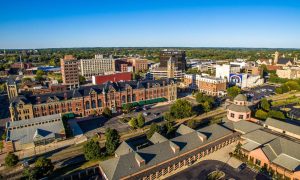Springfield, Ohio – a lightening rod for the US immigration debate
In a recent speech at a conservative political event in the US, Donald Trump’s running mate J D Vance alluded to the city of Springfield, in his home state of Ohio, as an example of how unchecked immigration is damaging America.
Vance said the influx of around 15,000 Haitians into the town of around 60,00 people had seen strains put on local services and jobs taken from Americans by the migrants.
But a closer examination of his claims reveals something completely different.
Springfield is typical of the so-called ‘rustbelt’ mid-western American towns and cities. The car industry was once the heartbeat of the city, but as the industry shrank, so did the population of the town.
In 2020, something unexpected happened when thousands of Haitian migrants, fleeing violence, economic ruin and poverty in their homeland, started to arrive in Springfield.
 Creole church services could be heard in the back streets and Haitian restaurants started popping up.
Creole church services could be heard in the back streets and Haitian restaurants started popping up.
Attracting the Haitians were the jobs on offer in local factories and the service industries. At first many of the Haitians struggled, living five to a room, but after some years, many were joined by their families.
In Vance’s memoir, Hillbilly Elegy, he describes the economic depression and white working-class alienation in the state of Ohio. Since becoming Vice Presidential candidate he has developed this theme into a narrative about migrants taking American jobs and driving down wages.
But many locals say the Haitians have breathed new life into Springvale.
The CEO of a local metal plant, Jamie McGregor, told National Public Radio (NPR) that in the wake of the COVID-19 pandemic, migrants were vital in his plant being able to keep up with demand for its products as the US economy roared back into life.
Mr McGregor said his company was profoundly affected by labour shortages, and 30 new Haitian migrant workers were key to filling the gaps.
There have also been spurious rumours and misinformation around Haitians committing crimes or acting in anti-social ways.
These have been debunked by the local police department and local civil rights groups have stepped in as the rhetoric has become more heated.
The local branch of the National Association for the Advancement of Coloured of People (NAACP) – a group that was at the forefront of the civil rights movement in the 1960s – is lending moral support.
The local NAACP president Denise Williams told NPR how the hate speech directed at the Haitians has brought back painful memories.
“I’m not surprised, I’m disgusted. I grew up in an all-white neighbourhood, so they were telling us, ‘go back to where you came from’. They would trash our yard. I’m 70 years old, and I’m still hearing ‘send them back’.”
The claim that migrant workers are stealing jobs is also damaging and untrue.
Ms Williams, who is also a local economics professor, said net immigration was good for the economy.
“Immigrants are creating demand, they need housing, they buy groceries and cars. They need goods and services like the rest of us,” she said.
She says the town desperately needs population for economic growth and for increased productivity.
“An immigration boom could be exactly what Springfield needs. It will be good in the long run for our economy. It’s just this transition period that I hope we can make it through to get to the other side and see the benefits,” Ms Williams said.












